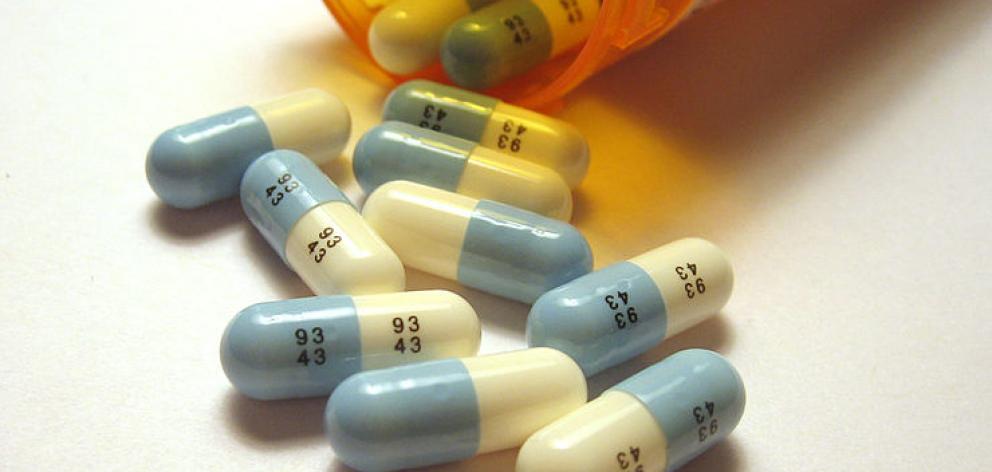
The number of children and teenagers on Prozac-style antidepressants has soared 98% in the last 10 years to a total of nearly 15,000 young people last year.
Ministry of Health figures released to the New Zealand Herald under the Official Information Act (OIA) showed 2163 children aged 13 or under collected a prescription of antidepressants known as Selective Serotonin Re-uptake Inhibitors (SSRIs) last year - an increase of 79.4% since 2006.
The number of 14 to 18-year-olds who collected a prescription of SSRIs increased 101.9% in the same timeframe to a total of 12,617 people last year.
Overall, 299,958 people were prescribed and collected the drugs last year - an increase of 64.9% over the last 10 years.
Ministry of Health deputy director of mental health Dr Ian Soosay said about one in five people would experience depression by the age of 18 so there had been an increased effort to reduce its impact through diagnosis and treatment.
While population growth may have played a part, he believed the increase was more likely because more people were aware of mental illness and were seeking help.
The use of the drugs had also increased because there were now fewer side effects associated with the medication and the drugs were less dangerous in overdose than older classes of antidepressants, Dr Soosay said.
A Medsafe prescriber update from 2009 advised SSRI use among children and adolescents had consistently been associated with an increase in suicidal thoughts and that no antidepressant had ministerial consent for treating major depressive disorder in children and adolescents so consent was needed from the patient or parent.
Dr Soosay confirmed there had been awareness of an increased risk of suicidal behaviour with young people on anti-depressants but said clinical teams worked with patients and their families to make decisions that balanced the benefits and risks of treatment.
A combination of anti-depressants and psychological therapies was recommended, he said.

Auckland University Associate Professor of psychiatry David Menkes said population growth would undoubtedly play a part in the increases. Another reason for the increase in prescriptions of SSRIs across the board may be because GPs were getting better at recognising and treating anxiety and depression so were prescribing the drugs more.
There was also the chance some people were prescribed the drugs unnecessarily after suffering stressful events when often all they needed was social support or time out, he said.
Prof Menkes said medication was not necessarily the best treatment for depression or anxiety. Therapy or counselling were also effective and were more appropriate in some situations, but the high demand for those services meant they were not always readily available so drugs were sometimes prescribed instead.
While the number of young people who had been prescribed SSRIs had almost doubled, they were still under-represented compared to the rest of the population, he said.
"Antidepressants are not generally recommended for children and adolescents but they are nonetheless prescribed in some cases because they can be helpful, particularly alongside other treatments," he said.
Mental Health Foundation chief executive Shaun Robinson agreed the increase may be due to more people seeking help, GPs becoming more aware of the signs of depression, a tendency to prescribe drugs as a first line of treatment and because SSRIs were sometimes used to treat other problems like chronic pain.
"We know that access to services including talking therapies can sometimes be difficult. We are certainly concerned that funding for mental health services hasn't kept pace with demand, and some sources of free counselling have been discontinued in recent years. We're encouraged by the success of e-therapies such as SPARX in supporting young people to recover from mild to moderate depression," he said.
Youthline spokesperson Briana Hill said the service was seeing an increase in people asking for help each year and an increase in the number of calls where there was a serious threat to the health of the caller or others, which was in line with the increase in prescriptions for SSRIs.
She said about 12% of the people the organisation spoke to cited mental health issues as the reason for their call, she said.
She felt the increase in numbers may be in part due to more awareness and more of a willingness to talk about mental health.
The most common issues that young people spoke to Youthline about were self-esteem, confidence, relationship issues, being accepted and bullying. The most common queries specifically relating to antidepressant medication were around feeling the drugs were not working or if there was a risk of becoming addicted, Ms Hill said.
In a speech last month Minister of Health Dr Jonathan Coleman said the drivers of mental health were complex and there was no simple answer as to why, across the world, there was increased demand.
"Our mental health can be impacted by many environmental and social factors. By bullying. By financial pressures. By trauma," he said. "As our understanding of mental health increases so does our willingness to report problems and seek help."
He also announced a new $7.5 million initiative to address the variation in the prescription of medications for people with mental health conditions by establishing a standardised, evidence-based practice for prescribing.












